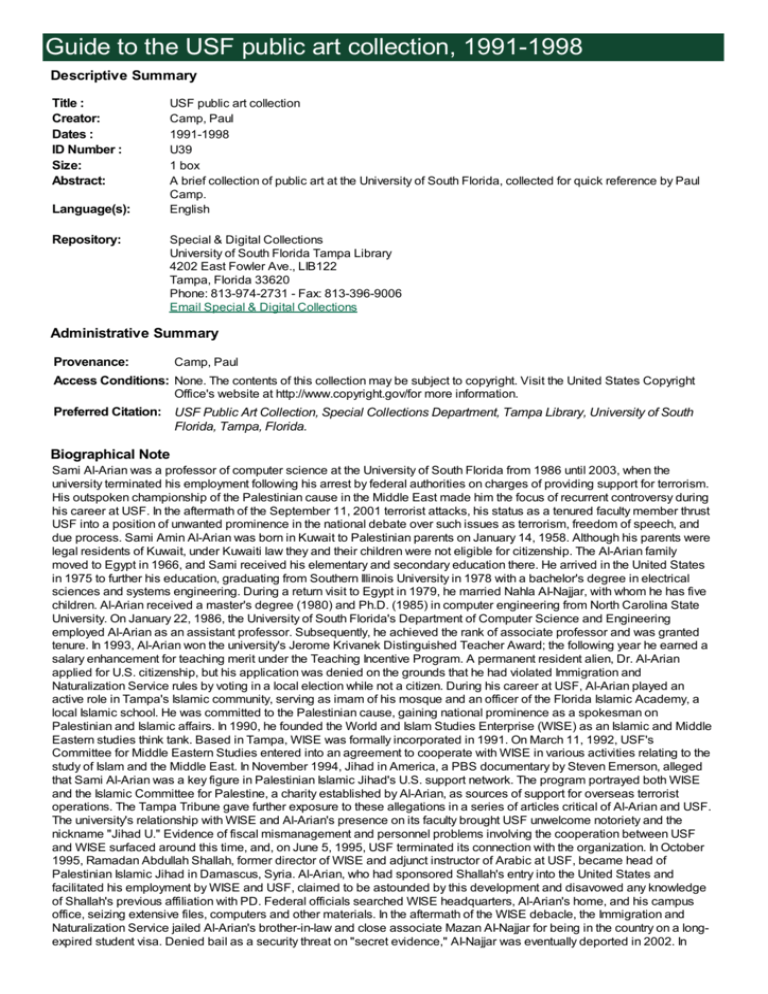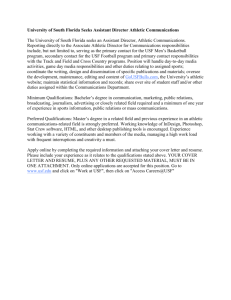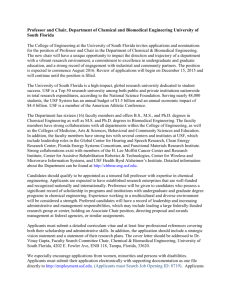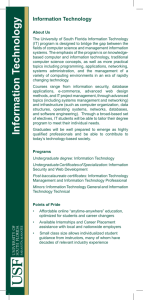
Guide to the USF public art collection, 1991-1998
Descriptive Summary
Title :
Creator:
Dates :
ID Number :
Size:
Abstract:
Language(s):
Repository:
USF public art collection
Camp, Paul
1991-1998
U39
1 box
A brief collection of public art at the University of South Florida, collected for quick reference by Paul
Camp.
English
Special & Digital Collections
University of South Florida Tampa Library
4202 East Fowler Ave., LIB122
Tampa, Florida 33620
Phone: 813-974-2731 - Fax: 813-396-9006
Email Special & Digital Collections
Administrative Summary
Provenance:
Camp, Paul
Access Conditions: None. The contents of this collection may be subject to copyright. Visit the United States Copyright
Office's website at http://www.copyright.gov/for more information.
Preferred Citation: USF Public Art Collection, Special Collections Department, Tampa Library, University of South
Florida, Tampa, Florida.
Biographical Note
Sami Al-Arian was a professor of computer science at the University of South Florida from 1986 until 2003, when the
university terminated his employment following his arrest by federal authorities on charges of providing support for terrorism.
His outspoken championship of the Palestinian cause in the Middle East made him the focus of recurrent controversy during
his career at USF. In the aftermath of the September 11, 2001 terrorist attacks, his status as a tenured faculty member thrust
USF into a position of unwanted prominence in the national debate over such issues as terrorism, freedom of speech, and
due process. Sami Amin Al-Arian was born in Kuwait to Palestinian parents on January 14, 1958. Although his parents were
legal residents of Kuwait, under Kuwaiti law they and their children were not eligible for citizenship. The Al-Arian family
moved to Egypt in 1966, and Sami received his elementary and secondary education there. He arrived in the United States
in 1975 to further his education, graduating from Southern Illinois University in 1978 with a bachelor's degree in electrical
sciences and systems engineering. During a return visit to Egypt in 1979, he married Nahla AI-Najjar, with whom he has five
children. Al-Arian received a master's degree (1980) and Ph.D. (1985) in computer engineering from North Carolina State
University. On January 22, 1986, the University of South Florida's Department of Computer Science and Engineering
employed Al-Arian as an assistant professor. Subsequently, he achieved the rank of associate professor and was granted
tenure. In 1993, Al-Arian won the university's Jerome Krivanek Distinguished Teacher Award; the following year he earned a
salary enhancement for teaching merit under the Teaching Incentive Program. A permanent resident alien, Dr. Al-Arian
applied for U.S. citizenship, but his application was denied on the grounds that he had violated Immigration and
Naturalization Service rules by voting in a local election while not a citizen. During his career at USF, Al-Arian played an
active role in Tampa's Islamic community, serving as imam of his mosque and an officer of the Florida Islamic Academy, a
local Islamic school. He was committed to the Palestinian cause, gaining national prominence as a spokesman on
Palestinian and Islamic affairs. In 1990, he founded the World and Islam Studies Enterprise (WISE) as an Islamic and Middle
Eastern studies think tank. Based in Tampa, WISE was formally incorporated in 1991. On March 11, 1992, USF's
Committee for Middle Eastern Studies entered into an agreement to cooperate with WISE in various activities relating to the
study of Islam and the Middle East. In November 1994, Jihad in America, a PBS documentary by Steven Emerson, alleged
that Sami Al-Arian was a key figure in Palestinian Islamic Jihad's U.S. support network. The program portrayed both WISE
and the Islamic Committee for Palestine, a charity established by Al-Arian, as sources of support for overseas terrorist
operations. The Tampa Tribune gave further exposure to these allegations in a series of articles critical of Al-Arian and USF.
The university's relationship with WISE and Al-Arian's presence on its faculty brought USF unwelcome notoriety and the
nickname "Jihad U." Evidence of fiscal mismanagement and personnel problems involving the cooperation between USF
and WISE surfaced around this time, and, on June 5, 1995, USF terminated its connection with the organization. In October
1995, Ramadan Abdullah Shallah, former director of WISE and adjunct instructor of Arabic at USF, became head of
Palestinian Islamic Jihad in Damascus, Syria. Al-Arian, who had sponsored Shallah's entry into the United States and
facilitated his employment by WISE and USF, claimed to be astounded by this development and disavowed any knowledge
of Shallah's previous affiliation with PD. Federal officials searched WISE headquarters, Al-Arian's home, and his campus
office, seizing extensive files, computers and other materials. In the aftermath of the WISE debacle, the Immigration and
Naturalization Service jailed Al-Arian's brother-in-law and close associate Mazan AI-Najjar for being in the country on a longexpired student visa. Denied bail as a security threat on "secret evidence," AI-Najjar was eventually deported in 2002. In
January 1996, USF retained distinguished attorney William Reece Smith, Jr. to investigate the university's former
relationship with WISE. In May, USF president Betty Castor placed Al-Arian on paid leave pending resolution of the
questions raised about his off-campus activities and suspect associates. After examining all currently available information,
Smith reported no evidence of wrong-doing. In the absence of any legal reason to the contrary, President Castor allowed AlArian to resume his regular faculty duties in August 1998. Outside the classroom, he continued to be an active advocate for
the Palestinian cause and a prominent spokesman for the Muslim community in the United States. During the 2000
presidential campaign, Al-Arian played an active role in mobilizing the Muslim vote for George Bush. On September 26,
2001, Al-Arian appeared on the Fox News program "The O'Reilly Factor," where host Bill O'Reilly grilled him rigorously about
his alleged ties to terrorism. Despite Al-Arian's denials, O'Reilly was not convinced. The broadcast, coming in the aftermath
of the September 11 terrorist attacks, sparked adverse public reaction. USF received a flood of telephone calls, e-mails, and
other communications about Al-Arian, ranging from complaints to threats of violence. For safety reasons, USF placed AlArian on paid leave on September 27 and, shortly thereafter, began investigating possible disciplinary action based on the
disruptive impact of his off-campus activities on university operations. On December 19, 2001, the USF Board of Trustees
passed a resolution urging President Judy Genshaft to fire Al-Arian. Later that day she notified Al-Arian of her intent to
terminate his employment. The Al-Arian case generated intense local and national comment, continuing over the next eight
months as President Genshaft tried to formulate an equitable decision. While many citizens and groups, including Florida
governor Jeb Bush and the USF Student Government, supported firing Al-Arian, opposition to terminating the controversial
professor was also widespread and vocal. President Genshaft received advice, opinions, and abuse from both sides,
including two petitions containing thousands of endorsements and comments. One petition demanded that Al-Arian be fired
at once, the other that he be reinstated immediately. The most significant opposition to terminating Al-Arian came from the
American Association of University Professors and the United Faculty of Florida. Both opposed termination without
adequate cause and due process as a violation of academic freedom and of Al-Arian's rights as a tenured faculty member.
Caught between public pressure to fire Al-Arian and equally ardent demands for his return to the classroom, on August 21,
2002 USF filed a complaint for declaratory relief asking the Thirteenth Judicial Circuit Court to rule on whether terminating AlArian's contract would violate his constitutional rights. Included was an amended letter of intent to terminate that added AlArian's alleged ties to terrorism to the grounds for dismissal. The case was removed to the U.S. District Court for the Middle
District of Florida at Al-Arian's petition. On December 16, the court dismissed the complaint on the grounds that such an
advisory ruling did not fall within the court's purview. On February 20, 2003, federal authorities arrested Dr. Al-Arian under a
l2l-page, fifty-one count indictment charging him with playing a major role in coordinating support operations for Palestinian
Islamic Jihad. The arrest was announced in a nationally televised press conference by U.S. Attorney General John Ashcroft
and generated a media feeding frenzy. Also arrested were Al-Arian associates Ghassan Zayed Ballut, Hatim Naji Fariz, and
Sameeh Hammoudeh. The indictment was based primarily on formerly restricted intelligence information recently made
available for use in criminal prosecutions by the Patriot Act. On February 26, 2003, President Genshaft terminated Al-Arian's
employment on the grounds of abusing his position at USF and misusing the university's name, reputation, and resources.
Evidence from the federal investigation of Al-Arian not previously available to the university was cited as a factor in this
decision. Al-Arian expressed his intent to challenge the termination through the university's appeal process but, at his
request, the appeal was delayed pending resolution of the federal charges against him. At its annual convention in July 2003,
the American Association of University Professors passed a resolution condemning the administration of the University of
South Florida for its handling of the Al-Arian case but stopped short of officially censuring the university. Al-Arian was refused
bond and was held under stringent security conditions in Coleman Federal Correctional Complex in Sumter County while
both sides prepared for what promised to be a long and complex trial. On September 21, 2004, an expanded, superseding
indictment was filed by the government. In October 2004, former USF president Betty Castor lost the U.S. Senate race to
Republican Mel Martinez in a campaign dominated by criticism of Castor's failure to fire Al-Arian during the 1995 -- 1996
WISE controversy. After several postponements, the trial of Al-Arian and co-defendants Hammoudeh, Ballut and Fariz
commenced in Tampa in June 2005 before Judge James S. Moody of the U.S. District Court, Middle District of Florida. The
case presented by the government was complicated, involving translations of hundreds of wire taps, fax intercepts and
similar information gathered by U.S. and Israeli intelligence operations. The bulk of the prosecution's evidence related to
activities dating from before President Bill Clinton designated PU as an illegal terrorist organization in 1995. While the
prosecution documented Al-Arian's clandestine relations with PU in great detail, whether this involvement constituted criminal
offenses was less clear. On December 6, 2005, after thirteen days of deliberations, the jury acquitted Al-Arian on eight of
seventeen counts and deadlocked on nine charges. He remained in custody, pending a government decision whether to retry
him on the nine outstanding counts. On April 14, 2006, Al-Arian agreed to a plea bargain under which he admitted guilt to
one count of conspiracy to provide services to Palestinian Islamic Jihad and agreed to deportation from the United States
upon completion of his sentence for this offence. In return, the government dropped the remaining charges. On May 1, 2006,
Judge Moody sentenced Al-Arian to fifty-seven months imprisonment which, with the thirty-nine months Al-Arian had already
been held while awaiting trial, left him an additional eighteen months to serve. On October 19, 2006, Al-Arian was summoned
to testify before an Alexandria, Virginia grand jury investigating the International Institute of Islamic Thought, an organization
located in Herndon, Virginia that had provided funding for WISE. Al-Arian refused, claiming his plea bargain explicitly freed
him from providing further information to the government. On November 16, 2006, a federal court ruled that the plea bargain
did not free him from the obligation to testify, as the prosecutors in the Virginia case had granted him immunity from
prosecution. In view of his continued refusal to testify, the court found Al-Arian guilty of contempt and condemned him to a
term of up to eighteen additional months of imprisonment, to be served before the outstanding time due on his original
sentence. This contempt of court sentence is being appealed at the time of writing.
Arrangement
Items are organized alphabetically.
Subject Headings
Art -- Florida -- Tampa -- Exhibitions
Subject Terms:
Occupation Terms: Artists -- Florida
COLLECTION CONTENTS
BOX 1
ITEM : USF Public Art Program: Alphabetical Bibliography, 1991-1998
FOLDER 2 : USF Public Art Program
FOLDER 3 : Bio - Holt, Nancy (Solar Rotary)
Last modified on November 4th, 2015
© Copyright 2015 USF Tampa Library - Special & Digital Collections. All rights reserved.







